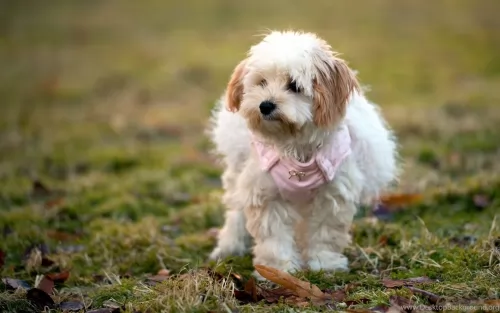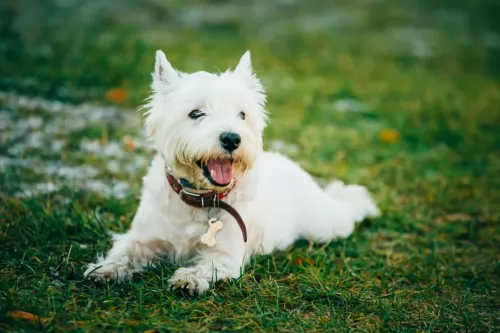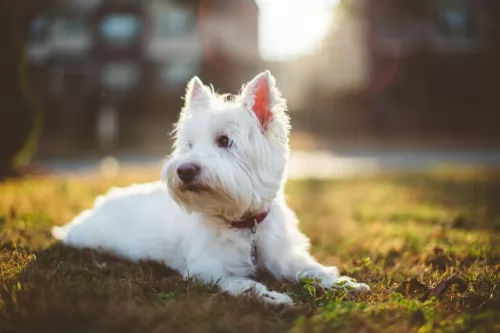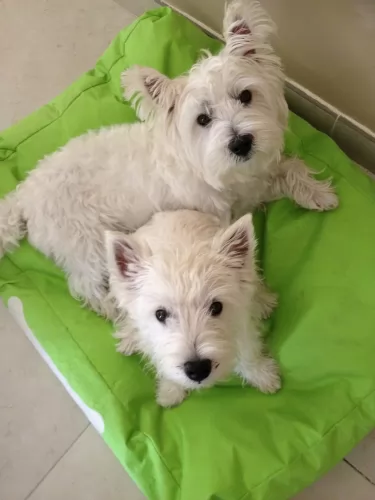 Petzlover
Petzlover West Highland White Terrier is originated from United Kingdom but South Russian Ovcharka is originated from Russia. West Highland White Terrier may grow 36 cm / 14 inches shorter than South Russian Ovcharka. West Highland White Terrier may weigh 42 kg / 92 pounds lesser than South Russian Ovcharka. West Highland White Terrier may live 5 years more than South Russian Ovcharka. Both West Highland White Terrier and South Russian Ovcharka has almost same litter size. West Highland White Terrier requires High Maintenance. But South Russian Ovcharka requires Moderate Maintenance
West Highland White Terrier is originated from United Kingdom but South Russian Ovcharka is originated from Russia. West Highland White Terrier may grow 36 cm / 14 inches shorter than South Russian Ovcharka. West Highland White Terrier may weigh 42 kg / 92 pounds lesser than South Russian Ovcharka. West Highland White Terrier may live 5 years more than South Russian Ovcharka. Both West Highland White Terrier and South Russian Ovcharka has almost same litter size. West Highland White Terrier requires High Maintenance. But South Russian Ovcharka requires Moderate Maintenance
 The West highland white terrier originated from Poltalloch in Scotland. So they were initially called as Poltalloch terrier and after that they were called as Roseneath terrier. They were initially used for hunting fox, badger, otter and in killing the vermin like rats.
The West highland white terrier originated from Poltalloch in Scotland. So they were initially called as Poltalloch terrier and after that they were called as Roseneath terrier. They were initially used for hunting fox, badger, otter and in killing the vermin like rats.
The breed history says that Colonel Malcolm of Poltalloch was the reason for the Westie's white colour. This is because in 19th centuryhe went for hunting with his dogs and accidentally he shot his dog as its colour was as fox. So he decided to breed only white colour dogs.
 Known also as the South Russian Sheepdog or the Ukranian Shepherd Dog, the South Russian Ovcharka’s history isn’t well established, and there are different stories to its history.
Known also as the South Russian Sheepdog or the Ukranian Shepherd Dog, the South Russian Ovcharka’s history isn’t well established, and there are different stories to its history.
Whatever their history, this large dog is closely related to the wolf and has also been crossed with sight hound dogs. Their numbers have been under threat when their role as herding dog was no longer needed for rural life.
It was in the 1920s however that the breed’s numbers were restored and the UKC officially recognised the South Russian Ovcharka in 1996.
 The Westie can be said as that a small dog having the talents of the big dog. They are very popular for their obedience. They are also working as therapy dogs and also some in search and rescue teams. The home having Westie will have fun always and be enthusiastic. They will suit them for country or city living, but they like to live with their family. They are well suitable for apartment living, but some training should be given to them for not barking. They can stay in home when you are at work. Westie can be taken to travel, whether it may be long vacation or a short visit.
The Westie can be said as that a small dog having the talents of the big dog. They are very popular for their obedience. They are also working as therapy dogs and also some in search and rescue teams. The home having Westie will have fun always and be enthusiastic. They will suit them for country or city living, but they like to live with their family. They are well suitable for apartment living, but some training should be given to them for not barking. They can stay in home when you are at work. Westie can be taken to travel, whether it may be long vacation or a short visit.
They are quick learners and so training them is not difficult. Mistakes of them can be corrected patiently since they don't like harsh activities against them. Westie will definitely bark when he sees something or hear different sounds. He will bark on seeing visitors or even other dogs. Sometimes they will bark for very silly things but when given appropriate training in their young stage, they can bark only for alerts.
 A large, big boned, well muscled herding dog, the South Russian Ovcharka stands at between 62 and 66cm in height and weighs between 46 and 52kg.
A large, big boned, well muscled herding dog, the South Russian Ovcharka stands at between 62 and 66cm in height and weighs between 46 and 52kg.
The dog has a thick, fairly coarse, weather-proof coat that can become long and this coat has always protected them from the harsh Russian winters.
He has small, floppy ears and the tail is medium length and also covered in thick fur.
These dogs need a lot of exercise and if you keep one as a pet he will need a lot of space to run and play. He guards his property too and makes a good watchdog.
He isn’t suited to living in small spaces in the city. He is a dominant, independent and strong willed dog so training and socialization will be important if you don’t want him to be unruly.
With the right kind of training, the South Russian Ovcharka can get along with pets and children in the home. He isn’t aggressive but he has strong guardian characteristics.
The first time dog owner would need to be firm, strong, confident, consistent and kind to handle this strong willed dog.
 The Westie is friendly with children but not all the time. So some care should be taken while they are near children.
The Westie is friendly with children but not all the time. So some care should be taken while they are near children.
They like to chase rodents like rabbits as they are interested in hunting.
They are suitable for apartment living unless they are left alone for a very long time. They love cold weather more than hot.
They can be trained by giving some extra efforts.
 The South Russian Ovcharka may well be independent and strong headed but there is nothing that a little bit of training and socialization can’t do.
The South Russian Ovcharka may well be independent and strong headed but there is nothing that a little bit of training and socialization can’t do.
He is intelligent and will pick up some obedience commands easily. He is is dog that will like a strong, firm, consistent owner - someone who likes to include him in all the family activities.
He can get on with children but is better suited to life on a larger property as opposed to living in a small city place. Treat him with firmness and fairness and you’ll get yourself an excellent pet and companion.
 This large breed has a lifespan of 9 to 11 years. Some of the health conditions to which this big dog can succumb are -
This large breed has a lifespan of 9 to 11 years. Some of the health conditions to which this big dog can succumb are -
This is something that affects many dogs, but particularly large dogs. When the hips haven’t formed properly, it can lead to pain, disability and arthritis.Lifestyle changes can help, like making sure your dog doesn’t pick up too much weight. For pain management you will need to get your pet to the vet.
Also known as Gastric Dilatation. The dog’s stomach fills with gas and can twist, and this in itself can be fatal. As soon as you see your pet pacing restlessly and he has a swollen stomach, he will need to get to the vet just as soon as possible.
 The puppy should be fed 3 to 4 times per day as it requires a considerable amount for their growth. Cooked chicken breast and turkey are best for them and also vegetables should be given to them. Beef and chicken should be kept a limit as it will lead to itchy skin and allergies.
The puppy should be fed 3 to 4 times per day as it requires a considerable amount for their growth. Cooked chicken breast and turkey are best for them and also vegetables should be given to them. Beef and chicken should be kept a limit as it will lead to itchy skin and allergies.
The preferable food for the Westie is home cooked. The home food will only contain all the essential nutrients for the Westie.
Eventhough the Westie is suitable for apartment living it is recommended to have a daily walk for him to be active and refreshing.
They should be made to play for atleast 30 minutes per day for their health as to not gain overweight. Grown up children can play with them as they like it.
 The long coat is certainly going to need a good brush at least twice a week as it can so easily become matted.
The long coat is certainly going to need a good brush at least twice a week as it can so easily become matted.
Because he has floppy ears, you will need to check inside the ears that they aren’t showing signs of redness, indicating the possibility of a ear infection. Check at the same time for ticks and fleas.
This dog is going to need a good deal of exercise to keep him content. He will love a long walk out and about. Robust games will also need to be provided. It’s why he isn’t looked upon as a dog suited to the city. He needs a lot of space and can become frustrated and destructive if his exercise needs aren’t met.
A dog is part of the family and he therefore deserves a good meal too. Good food is beneficial as it means your dog is less likely to get sick.
Like many dog owners, you’ll no doubt appreciate the convenience of commercially manufactured dog foods. You’ll need to choose the best one though because the inferior ones are made up of bad ingredients – fillers that have no goodness whatsoever.
To provide your South Russian Ovcharka with a tasty treat, try and give him some home-made food. Boiled chicken, rice or pasta, sweet potatoes, carrots and spinach are simple and tasty and won’t trouble your dog’s stomach.
Chop some of it up and add a small portion of this into his dry kibble twice a week. Your dog’s wagging tail will tell you how much he loves it.
To avoid skin infections, try to include some raw meat into his diet too when you can. Make sure your dog has a constant supply of fresh, cool water.